- Home
- Julia Quinn
It's in His Kiss Page 4
It's in His Kiss Read online
Page 4
“And do you include yourself among those ranks, Miss Bridgerton?”
She looked up at him with those intensely blue eyes. “I wouldn’t have thought to describe myself as such, but yes, I suppose I am. Your grandmother, too, although she would deny it to her dying breath.”
Gareth felt himself laugh as he watched his grandmother poke the Duke of Ashbourne in the leg with her cane. “Yes, she would, wouldn’t she?”
His maternal grandmother was, since the death of his brother George, the only person left in the world he truly loved. After his father had booted him out, he’d made his way to Danbury House in Surrey and told her what had transpired. Minus the bit about his bastardy, of course.
Gareth had always suspected that Lady Danbury would have stood up and cheered if she knew he wasn’t really a St. Clair. She’d never liked her son-in-law, and in fact routinely referred to him as “that pompous idiot.” But the truth would reveal his mother—Lady Danbury’s youngest daughter—as an adulteress, and he hadn’t wanted to dishonor her in that way.
And strangely enough, his father—funny how he still called him that, even after all these years—had never publicly denounced him. This had not surprised Gareth at first. Lord St. Clair was a proud man, and he certainly would not relish revealing himself as a cuckold. Plus, he probably still hoped that he might eventually rein Gareth in and bend him to his will. Maybe even get him to marry Mary Winthrop and restore the St. Clair family coffers.
But George had contracted some sort of wasting disease at the age of twenty-seven, and by thirty he was dead.
Without a son.
Which had made Gareth the St. Clair heir. And left him, quite simply, stuck. For the past eleven months, it seemed he had done nothing but wait. Sooner or later, his father was going to announce to all who would listen that Gareth wasn’t really his son. Surely the baron, whose third-favorite pastime (after hunting and raising hounds) was tracing the St. Clair family tree back to the Plantagenets, would not countenance his title going to a bastard of uncertain blood.
Gareth was fairly certain that the only way the baron could remove him as his heir would be to haul him, and a pack of witnesses as well, before the Committee for Privileges in the House of Lords. It would be a messy, detestable affair, and it probably wouldn’t work, either. The baron had been married to Gareth’s mother when she had given birth, and that rendered Gareth legitimate in the eyes of the law, regardless of his bloodlines.
But it would cause a huge scandal and quite possibly ruin Gareth in the eyes of society. There were plenty of aristocrats running about who got their blood and their names from two different men, but the ton didn’t like to talk about it. Not publicly, anyway.
But thus far, his father had said nothing.
Half the time Gareth wondered if the baron kept his silence just to torture him.
Gareth glanced across the room at his grandmother, who was accepting a glass of lemonade from Penelope Bridgerton, whom she’d somehow coerced into waiting on her hand and foot. Agatha, Lady Danbury, was most usually described as crotchety, and that was by the people who held her in some affection. She was a lioness among the ton, fearless in her words and willing to poke fun at the most august of personages, and even, occasionally, herself. But for all her acerbic ways, she was famously loyal to the ones she loved, and Gareth knew he ranked at the top of that list.
When he’d gone to her and told her that his father had turned him out, she had been livid, but she had never attempted to use her power as a countess to force Lord St. Clair to take back his son.
“Ha!” his grandmother had said. “I’d rather keep you myself.”
And she had. She’d paid Gareth’s expenses at Cambridge, and when he’d graduated (not with a first, but he had acquitted himself well), she had informed him that his mother had left him a small bequest. Gareth hadn’t been aware that she’d had any money of her own, but Lady Danbury had just twisted her lips and said, “Do you really think I’d let that idiot have complete control of her money? I wrote the marriage settlement, you know.”
Gareth didn’t doubt it for an instant.
His inheritance gave him a small income, which funded a very small suite of apartments, and Gareth was able to support himself. Not lavishly, but well enough to make him feel he wasn’t a complete wastrel, which, he was surprised to realize, mattered more to him than he would have thought.
This uncharacteristic sense of responsibility was probably a good thing, too, since when he did assume the St. Clair title, he was going to inherit a mountain of debt along with it. The baron had obviously been lying when he’d told Gareth that they would lose everything that wasn’t entailed if he didn’t marry Mary Winthrop, but still, it was clear that the St. Clair fortune was meager at best. Furthermore, Lord St. Clair didn’t appear to be managing the family finances any better than he had when he’d tried to force Gareth into marriage. If anything, he seemed to be systematically running the estates into the ground.
It was the one thing that made Gareth wonder if perhaps the baron didn’t intend to denounce him. Surely the ultimate revenge would be to leave his false son riddled with debt.
And Gareth knew—with every fiber of his being he knew—that the baron wished him no happiness. Gareth didn’t bother with most ton functions, but London wasn’t such a large city, socially speaking, and he couldn’t always manage to avoid his father completely. And Lord St. Clair never made any effort to hide his enmity.
As for Gareth—well, he wasn’t much better at keeping his feelings to himself. He always seemed to slip into his old ways, doing something deliberately provoking, just to make the baron angry. The last time they’d found themselves in each other’s company, Gareth had laughed too loudly, then danced far too closely with a notoriously merry widow.
Lord St. Clair had turned very red in the face, then hissed something about Gareth being no better than he should be. Gareth hadn’t been exactly certain to what his father had been referring, and the baron had been drunk, in any case. But it had left him with one powerful certainty—
Eventually, the other shoe was going to drop. When Gareth least expected it, or perhaps, now that he’d grown so suspicious, precisely when he most suspected it. But as soon as Gareth attempted to make a change in his life, to move forward, to move up…
That was when the baron would make his move. Gareth was sure of it.
And his world was going to come crashing down.
“Mr. St. Clair?”
Gareth blinked and turned to Hyacinth Bridgerton, whom, he realized somewhat sheepishly, he’d been ignoring in favor of his own thoughts. “So sorry,” he murmured, giving her the slow and easy smile that seemed to work so well when he needed to placate a female. “I was woolgathering.”
At her dubious expression, he added, “I do think from time to time.”
She smiled, clearly despite herself, but he counted that as a success. The day he couldn’t make a woman smile was the day he ought to just give up on life and move to the Outer Hebrides.
“Under normal circumstances,” he said, since the occasion seemed to call for polite conversation, “I would ask if you enjoyed the musicale, but somehow that seems cruel.”
She shifted slightly in her seat, which was interesting, since most young ladies were trained from a very young age to hold themselves with perfect stillness. Gareth found himself liking her the better for her restless energy; he, too, was the sort to find himself drumming his fingers against a tabletop when he didn’t realize it.
He watched her face, waiting for her to reply, but all she did was look vaguely uncomfortable. Finally, she leaned forward and whispered, “Mr. St. Clair?”
He leaned in as well, giving her a conspiratorial quirk of his brow. “Miss Bridgerton?”
“Would you mind terribly if we took a turn about the room?”
He waited just long enough to catch her motioning over her shoulder with the tiniest of nods. Lord Somershall was wiggling slightly in his chair, a
nd his copious form was edged right up next to Hyacinth.
“Of course,” Gareth said gallantly, rising to his feet and offering her his arm. “I need to save Lord Somershall, after all,” he said, once they had moved several paces away.
Her eyes snapped to his face. “I beg your pardon?”
“If I were a betting man,” he said, “I’d lay the odds four-to-one in your favor.”
For about half a second she looked confused, and then her face slid into a satisfied smile. “You mean you’re not a betting man?” she asked.
He laughed. “I haven’t the blunt to be a betting man,” he said quite honestly.
“That doesn’t seem to stop most men,” she said pertly.
“Or most women,” he said, with a tilt of his head.
“Touché,” she murmured, glancing about the room. “We are a gambling people, aren’t we?”
“And what about you, Miss Bridgerton? Do you like to wager?”
“Of course,” she said, surprising him with her candor. “But only when I know I will win.”
He chuckled. “Strangely enough,” he said, guiding her toward the refreshment table, “I believe you.”
“Oh, you should,” she said blithely. “Ask anyone who knows me.”
“Wounded again,” he said, offering her his most engaging smile. “I thought I knew you.”
She opened her mouth, then looked shocked that she didn’t have a reply. Gareth took pity on her and handed her a glass of lemonade. “Drink up,” he murmured. “You look thirsty.”
He chuckled as she glowered at him over the rim of her glass, which of course only made her redouble her efforts to incinerate him with her glare.
There was something very amusing about Hyacinth Bridgerton, he decided. She was smart—very smart—but she had a certain air about her, as if she was used to always being the most intelligent person in the room. It wasn’t unattractive; she was quite charming in her own way, and he imagined that she would have to have learned to speak her own mind in order to be heard in her family—she was the youngest of eight, after all.
But it did mean that he rather enjoyed seeing her at a loss for words. It was fun to befuddle her. Gareth didn’t know why he didn’t make a point of doing it more often.
He watched as she set her glass down. “Tell me, Mr. St. Clair,” she said, “what did your grandmother say to you to convince you to attend this evening?”
“You don’t believe I came of my own free will?”
She lifted one brow. He was impressed. He’d never known a female who could do that.
“Very well,” he said, “there was a great deal of hand fluttering, then something about a visit to her physician, and then I believe she sighed.”
“Just once?”
He quirked a brow back at her. “I’m made of stronger stuff than that, Miss Bridgerton. It took a full half hour to break me.”
She nodded. “You are good.”
He leaned toward her and smiled. “At many things,” he murmured.
She blushed, which pleased him mightily, but then she said, “I’ve been warned about men like you.”
“I certainly hope so.”
She laughed. “I don’t think you’re nearly as dangerous as you’d like to be thought.”
He tilted his head to the side. “And why is that?”
She didn’t answer right away, just caught her lower lip between her teeth as she pondered her words. “You’re far too kind to your grandmother,” she finally said.
“Some would say she’s too kind to me.”
“Oh, many people say that,” Hyacinth said with a shrug.
He choked on his lemonade. “You haven’t a coy bone in your body, do you?”
Hyacinth glanced across the room at Penelope and Lady Danbury before turning back to him. “I keep trying, but no, apparently not. I imagine it’s why I am still unmarried.”
He smiled. “Surely not.”
“Oh, indeed,” she said, even though it was clear he was funning her. “Men need to be trapped into marriage, whether they realize it or not. And I seem to be completely lacking in the ability.”
He grinned. “You mean you’re not underhanded and sly?”
“I’m both those things,” she admitted, “just not subtle.”
“No,” he murmured, and she couldn’t decide whether his agreement bothered her or not.
“But tell me,” he continued, “for I’m most curious. Why do you think men must be trapped into marriage?”
“Would you go willingly to the altar?”
“No, but—”
“You see? I am affirmed.” And somehow that made her feel a great deal better.
“Shame on you, Miss Bridgerton,” he said. “It’s not very sporting of you not to allow me to finish my statement.”
She cocked her head. “Did you have anything interesting to say?”
He smiled, and Hyacinth felt it down to her toes. “I’m always interesting,” he murmured.
“Now you’re just trying to scare me.” She didn’t know where this was coming from, this crazy sense of daring. Hyacinth wasn’t shy, and she certainly wasn’t as demure as she ought to have been, but nor was she foolhardy. And Gareth St. Clair was not the sort of man with whom one ought to trifle. She was playing with fire, and she knew it, but somehow she couldn’t stop herself. It was as if each statement from his lips was a dare, and she had to use her every faculty just to keep up.
If this was a competition, she wanted to win.
And if any of her flaws was going to prove to be fatal, this was surely it.
“Miss Bridgerton,” he said, “the devil himself couldn’t scare you.”
She forced her eyes to meet his. “That’s not a compliment, is it?”
He lifted her hand to his lips, brushing a feather-light kiss across her knuckles. “You’ll have to figure that out for yourself,” he murmured.
To all who observed, he was the soul of propriety, but Hyacinth caught the daring gleam in his eye, and she felt the breath leave her body as tingles of electricity rushed across her skin. Her lips parted, but she had nothing to say, not a single word. There was nothing but air, and even that seemed in short supply.
And then he straightened as if nothing had happened and said, “Do let me know what you decide.”
She just stared at him.
“About the compliment,” he added. “I am sure you will wish to let me know how I feel about you.”
Her mouth fell open.
He smiled. Broadly. “Speechless, even. I’m to be commended.”
“You—”
“No. No,” he said, lifting one hand in the air and pointing toward her as if what he really wanted to do was place his finger on her lips and shush her. “Don’t ruin it. The moment is too rare.”
And she could have said something. She should have said something. But all she could do was stand there like an idiot, or if not that, then like someone completely unlike herself.
“Until next time, Miss Bridgerton,” he murmured.
And then he was gone.
Chapter 3
Three days later, and our hero learns that one can never really escape one’s past.
“There is a woman to see you, sir.”
Gareth looked up from his desk, a huge mahogany behemoth that took up nearly half of his small study. “A woman, you say?”
His new valet nodded. “She said she is your brother’s wife.”
“Caroline?” Gareth’s attention snapped into sharp focus. “Show her in. Immediately.”
He rose to his feet, awaiting her arrival in his study. He hadn’t seen Caroline in months, only once since George’s funeral, truth be told. And Lord knew that hadn’t been a joyful affair. Gareth had spent the entire time avoiding his father, which had added stress on top of his already crushing grief.
Lord St. Clair had ordered George to cease all brotherly relations with Gareth, but George had never cut him off. In all else, George had obeyed his father, but ne
ver that. And Gareth had loved him all the more for it. The baron hadn’t wanted Gareth to attend the ceremony, but when Gareth had pushed his way into the church, even he hadn’t been willing to make a scene and have him evicted.
“Gareth?”
He turned away from the window, unaware that he’d even been looking out. “Caroline,” he said warmly, crossing the room to greet his sister-in-law. “How have you been?”
She gave a helpless little shrug. Hers had been a love match, and Gareth had never seen anything quite as devastating as Caroline’s eyes at her husband’s funeral.
“I know,” Gareth said quietly. He missed George, too. They had been an unlikely pair—George, sober and serious, and Gareth, who had always run wild. But they had been friends as well as brothers, and Gareth liked to think that they had complemented each other. Lately Gareth had been thinking that he ought to try to lead a somewhat tamer life, and he had been looking to his brother’s memory to guide his actions.
“I was going through his things,” Caroline said. “I found something. I believe that it is yours.”
Gareth watched curiously as she reached into her satchel and pulled out a small book. “I don’t recognize it,” he said.
“No,” Caroline replied, handing it to him. “You wouldn’t. It belonged to your father’s mother.”
Your father’s mother. Gareth couldn’t quite prevent his grimace. Caroline did not know that Gareth was not truly a St. Clair. Gareth had never been certain if George had known the truth, either. If he had, he’d never said anything.
The book was small, bound with brown leather. There was a little strap that reached from back to front, where it could be fastened with a button. Gareth carefully undid it and turned the book open, taking extra care with the aged paper. “It’s a diary,” he said with surprise. And then he had to smile. It was written in Italian. “What does it say?”
“I don’t know,” Caroline said. “I didn’t even know it existed until I found it in George’s desk earlier this week. He never mentioned it.”
Gareth looked down at the diary, at the elegant handwriting forming words he could not understand. His father’s mother had been the daughter of a noble Italian house. It had always amused Gareth that his father was half-Italian; the baron was so insufferably proud of his St. Clair ancestry and liked to boast that they had been in England since the Norman Invasion. In fact, Gareth couldn’t recall him ever making mention of his Italian roots.

 Just Like Heaven
Just Like Heaven B03.2 An Offer from a Gentleman Ep II
B03.2 An Offer from a Gentleman Ep II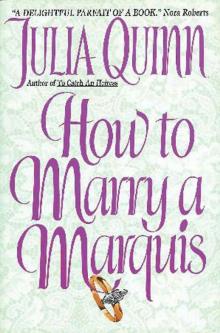 How to Marry a Marquis
How to Marry a Marquis When He Was Wicked: The 2nd Epilogue
When He Was Wicked: The 2nd Epilogue Ten Things I Love About You
Ten Things I Love About You The Viscount Who Loved Me
The Viscount Who Loved Me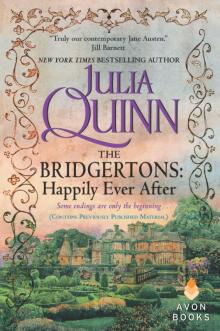 The Duke and I
The Duke and I B05.2 To Sir Philip With Love Ep II
B05.2 To Sir Philip With Love Ep II An Offer From a Gentleman: The 2nd Epilogue
An Offer From a Gentleman: The 2nd Epilogue Minx
Minx On the Way to the Wedding with 2nd Epilogue
On the Way to the Wedding with 2nd Epilogue Mr. Cavendish, I Presume
Mr. Cavendish, I Presume A Night Like This
A Night Like This Splendid
Splendid Everything and the Moon
Everything and the Moon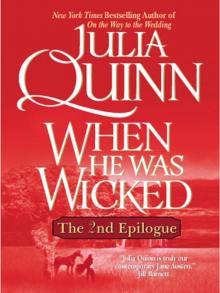 When He Was Wicked
When He Was Wicked Dancing at Midnight
Dancing at Midnight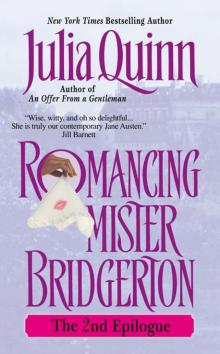 Bridgerton 04: 2nd Epilogue - Romancing Mister Bridgerton
Bridgerton 04: 2nd Epilogue - Romancing Mister Bridgerton The Lost Duke of Wyndham
The Lost Duke of Wyndham To Sir Phillip, With Love
To Sir Phillip, With Love It's in His Kiss
It's in His Kiss The Other Miss Bridgerton
The Other Miss Bridgerton Bridgerton 02: 2nd Epilogue - The Viscount Who Loved Me
Bridgerton 02: 2nd Epilogue - The Viscount Who Loved Me The Secrets of Sir Richard Kenworthy
The Secrets of Sir Richard Kenworthy On the Way to the Wedding
On the Way to the Wedding The Secret Diaries of Miss Miranda Cheever
The Secret Diaries of Miss Miranda Cheever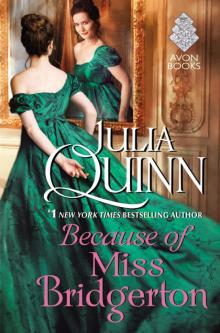 Because of Miss Bridgerton
Because of Miss Bridgerton What Happens in London
What Happens in London JQuinn - The Secret Diaries of Miss Miranda Cheever
JQuinn - The Secret Diaries of Miss Miranda Cheever The Girl With the Make-Believe Husband
The Girl With the Make-Believe Husband First Comes Scandal
First Comes Scandal To Catch an Heiress
To Catch an Heiress The Sum of All Kisses
The Sum of All Kisses An Offer From a Gentleman
An Offer From a Gentleman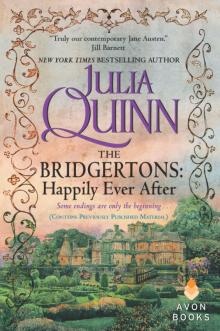 The Bridgertons: Happily Ever After
The Bridgertons: Happily Ever After Bridgerton Collection Volume 1 (Bridgertons)
Bridgerton Collection Volume 1 (Bridgertons)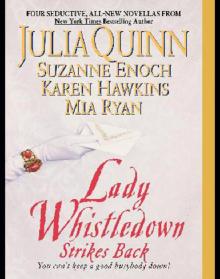 Lady Whistledown Strikes Back
Lady Whistledown Strikes Back Secret Diaries of Miss Miranda Cheever
Secret Diaries of Miss Miranda Cheever An Offer from a Gentleman with 2nd Epilogue
An Offer from a Gentleman with 2nd Epilogue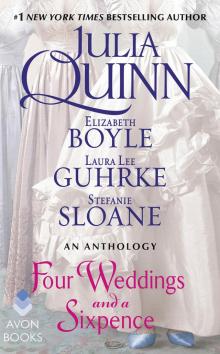 Four Weddings and a Sixpence
Four Weddings and a Sixpence An Offer from a Gentleman: The Epilogue II
An Offer from a Gentleman: The Epilogue II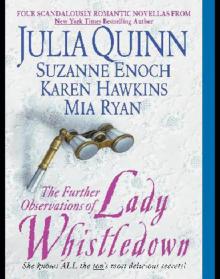 The Further Observations of Lady Whistledown
The Further Observations of Lady Whistledown The Viscount Who Loved Me: The Epilogue II
The Viscount Who Loved Me: The Epilogue II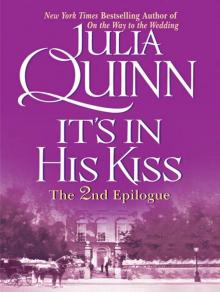 It’s In His Kiss Epilogue II
It’s In His Kiss Epilogue II To Sir Phillip, with Love: The Epilogue II
To Sir Phillip, with Love: The Epilogue II The Secret Diaries of Miss Miranda Cheevers
The Secret Diaries of Miss Miranda Cheevers A Night Like This (Smythe-Smith Quartet)
A Night Like This (Smythe-Smith Quartet)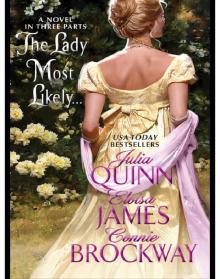 The Lady Most Likely...
The Lady Most Likely... Bridgerton 06: 2nd Epilogue - When He Was Wicked
Bridgerton 06: 2nd Epilogue - When He Was Wicked Just Like Heaven sq-1
Just Like Heaven sq-1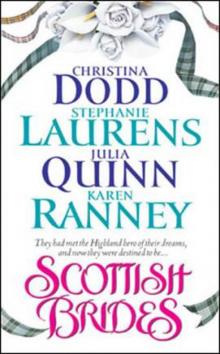 Gretna Greene
Gretna Greene